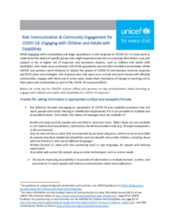While engaging with communities and larger populations in the response to COVID-19, it is important to understand the needs of specific groups who might experience barriers to accessing information, care and support or be at higher risk of exposure and secondary impacts, such as children and adults with disabilities, who make up an estimated 15% of the population and are often invisible and excluded. While UNICEF and partners work tirelessly to reduce the spread of COVID-19 and develop inclusive response and RCCE plans and strategies, this response also calls upon us to consult and work closely with affected communities, engage with them and in some cases, make them champions of change in reaching out to their peers and communities as part of the COVID-19 response efforts.
This guidance note presents some tips for UNICEF country offices and partners on key considerations when planning to engage with children and adults with disabilities for COVID-19 response.
View other language versions here.

